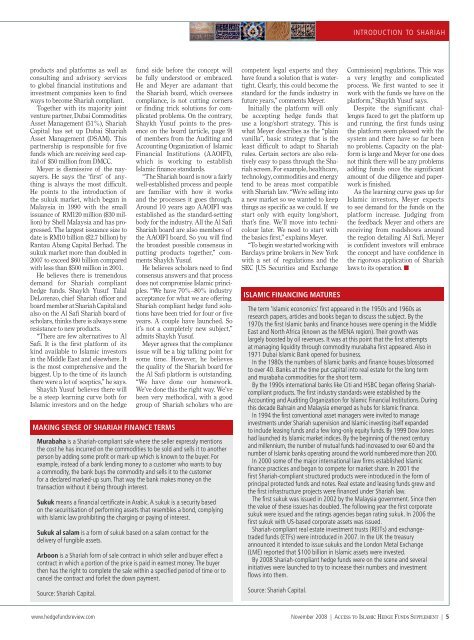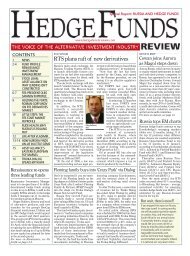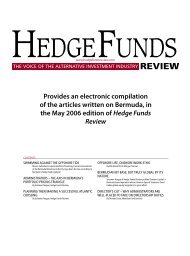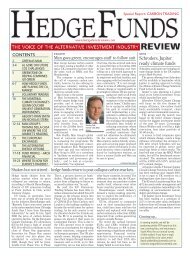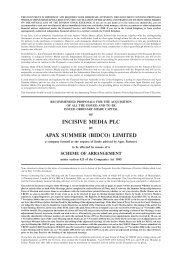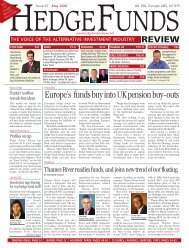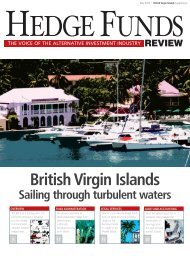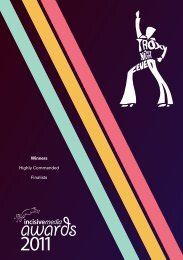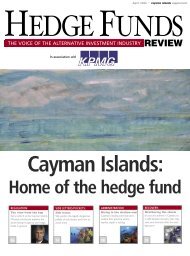Access to Islamic Hedge Funds - Incisive Media
Access to Islamic Hedge Funds - Incisive Media
Access to Islamic Hedge Funds - Incisive Media
Create successful ePaper yourself
Turn your PDF publications into a flip-book with our unique Google optimized e-Paper software.
introduction <strong>to</strong> shariah<br />
products and platforms as well as<br />
consulting and advisory services<br />
<strong>to</strong> global financial institutions and<br />
investment companies keen <strong>to</strong> find<br />
ways <strong>to</strong> become Shariah compliant.<br />
Together with its majority joint<br />
venture partner, Dubai Commodities<br />
Asset Management (51%), Shariah<br />
Capital has set up Dubai Shariah<br />
Asset Management (DSAM). This<br />
partnership is responsible for five<br />
funds which are receiving seed capital<br />
of $50 million from DMCC.<br />
Meyer is dismissive of the naysayers.<br />
He says the ‘first’ of anything<br />
is always the most difficult.<br />
He points <strong>to</strong> the introduction of<br />
the sukuk market, which began in<br />
Malaysia in 1990 with the small<br />
issuance of RM120 million ($30 million)<br />
by Shell Malaysia and has progressed.<br />
The largest issuance size <strong>to</strong><br />
date is RM10 billion ($2.7 billion) by<br />
Rantau Abang Capital Berhad. The<br />
sukuk market more than doubled in<br />
2007 <strong>to</strong> exceed $60 billion compared<br />
with less than $500 million in 2001.<br />
He believes there is tremendous<br />
demand for Shariah compliant<br />
hedge funds. Shaykh Yusuf Talal<br />
DeLorenzo, chief Shariah officer and<br />
board member at Shariah Capital and<br />
also on the Al Safi Shariah board of<br />
scholars, thinks there is always some<br />
resistance <strong>to</strong> new products.<br />
“There are few alternatives <strong>to</strong> Al<br />
Safi. It is the first platform of its<br />
kind available <strong>to</strong> <strong>Islamic</strong> inves<strong>to</strong>rs<br />
in the Middle East and elsewhere. It<br />
is the most comprehensive and the<br />
biggest. Up <strong>to</strong> the time of its launch<br />
there were a lot of sceptics,” he says.<br />
Shaykh Yusuf believes there will<br />
be a steep learning curve both for<br />
<strong>Islamic</strong> inves<strong>to</strong>rs and on the hedge<br />
making sense of shariah finance terms<br />
fund side before the concept will<br />
be fully unders<strong>to</strong>od or embraced.<br />
He and Meyer are adamant that<br />
the Shariah board, which oversees<br />
compliance, is not cutting corners<br />
or finding trick solutions for complicated<br />
problems. On the contrary,<br />
Shaykh Yusuf points <strong>to</strong> the presence<br />
on the board (article, page 9)<br />
of members from the Auditing and<br />
Accounting Organization of <strong>Islamic</strong><br />
Financial Institutions (AAOIFI),<br />
which is working <strong>to</strong> establish<br />
<strong>Islamic</strong> finance standards.<br />
“The Shariah board is now a fairly<br />
well-established process and people<br />
are familiar with how it works<br />
and the processes it goes through.<br />
Around 10 years ago AAOIFI was<br />
established as the standard-setting<br />
body for the industry. All the Al Safi<br />
Shariah board are also members of<br />
the AAOIFI board. So you will find<br />
the broadest possible consensus in<br />
putting products <strong>to</strong>gether,” comments<br />
Shaykh Yusuf.<br />
He believes scholars need <strong>to</strong> find<br />
consensus answers and that process<br />
does not compromise <strong>Islamic</strong> principles.<br />
“We have 70%–80% industry<br />
acceptance for what we are offering.<br />
Shariah compliant hedge fund solutions<br />
have been tried for four or five<br />
years. A couple have launched. So<br />
it’s not a completely new subject,”<br />
admits Shaykh Yusuf.<br />
Meyer agrees that the compliance<br />
issue will be a big talking point for<br />
some time. However, he believes<br />
the quality of the Shariah board for<br />
the Al Safi platform is outstanding.<br />
“We have done our homework.<br />
We’ve done this the right way. We’ve<br />
been very methodical, with a good<br />
group of Shariah scholars who are<br />
Murabaha is a Shariah-compliant sale where the seller expressly mentions<br />
the cost he has incurred on the commodities <strong>to</strong> be sold and sells it <strong>to</strong> another<br />
person by adding some profit or mark-up which is known <strong>to</strong> the buyer. For<br />
example, instead of a bank lending money <strong>to</strong> a cus<strong>to</strong>mer who wants <strong>to</strong> buy<br />
a commodity, the bank buys the commodity and sells it <strong>to</strong> the cus<strong>to</strong>mer<br />
for a declared marked-up sum. That way the bank makes money on the<br />
transaction without it being through interest.<br />
Sukuk means a financial certificate in Arabic. A sukuk is a security based<br />
on the securitisation of performing assets that resembles a bond, complying<br />
with <strong>Islamic</strong> law prohibiting the charging or paying of interest.<br />
Sukuk al salam is a form of sukuk based on a salam contract for the<br />
delivery of fungible assets.<br />
Arboon is a Shariah form of sale contract in which seller and buyer effect a<br />
contract in which a portion of the price is paid in earnest money. The buyer<br />
then has the right <strong>to</strong> complete the sale within a specified period of time or <strong>to</strong><br />
cancel the contract and forfeit the down payment.<br />
Source: Shariah Capital.<br />
competent legal experts and they<br />
have found a solution that is watertight.<br />
Clearly, this could become the<br />
standard for the funds industry in<br />
future years,” comments Meyer.<br />
Initially the platform will only<br />
be accepting hedge funds that<br />
use a long/short strategy. This is<br />
what Meyer describes as the “plain<br />
vanilla”, basic strategy that is the<br />
least difficult <strong>to</strong> adapt <strong>to</strong> Shariah<br />
rules. Certain sec<strong>to</strong>rs are also relatively<br />
easy <strong>to</strong> pass through the Shariah<br />
screen. For example, healthcare,<br />
technology, commodities and energy<br />
tend <strong>to</strong> be areas most compatible<br />
with Shariah law. “We’re selling in<strong>to</strong><br />
a new market so we wanted <strong>to</strong> keep<br />
things as specific as we could. If we<br />
start only with equity long/short,<br />
that’s fine. We’ll move in<strong>to</strong> technicolour<br />
later. We need <strong>to</strong> start with<br />
the basics first,” explains Meyer.<br />
“To begin we started working with<br />
Barclays prime brokers in New York<br />
with a set of regulations and the<br />
SEC [US Securities and Exchange<br />
islamic financing matures<br />
Commission] regulations. This was<br />
a very lengthy and complicated<br />
process. We first wanted <strong>to</strong> see it<br />
work with the funds we have on the<br />
platform,” Shaykh Yusuf says.<br />
Despite the significant challenges<br />
faced <strong>to</strong> get the platform up<br />
and running, the first funds using<br />
the platform seem pleased with the<br />
system and there have so far been<br />
no problems. Capacity on the platform<br />
is large and Meyer for one does<br />
not think there will be any problems<br />
adding funds once the significant<br />
amount of due diligence and paperwork<br />
is finished.<br />
As the learning curve goes up for<br />
<strong>Islamic</strong> inves<strong>to</strong>rs, Meyer expects<br />
<strong>to</strong> see demand for the funds on the<br />
platform increase. Judging from<br />
the feedback Meyer and others are<br />
receiving from roadshows around<br />
the region detailing Al Safi, Meyer<br />
is confident inves<strong>to</strong>rs will embrace<br />
the concept and have confidence in<br />
the rigorous application of Shariah<br />
laws <strong>to</strong> its operation. n<br />
The term ‘<strong>Islamic</strong> economics’ first appeared in the 1950s and 1960s as<br />
research papers, articles and books began <strong>to</strong> discuss the subject. By the<br />
1970s the first <strong>Islamic</strong> banks and finance houses were opening in the Middle<br />
East and North Africa (known as the MENA region). Their growth was<br />
largely boosted by oil revenues. It was at this point that the first attempts<br />
at managing liquidity through commodity murabaha first appeared. Also in<br />
1971 Dubai <strong>Islamic</strong> Bank opened for business.<br />
In the 1980s the numbers of <strong>Islamic</strong> banks and finance houses blossomed<br />
<strong>to</strong> over 40. Banks at the time put capital in<strong>to</strong> real estate for the long term<br />
and murabaha commodities for the short term.<br />
By the 1990s international banks like Citi and HSBC began offering Shariahcompliant<br />
products. The first industry standards were established by the<br />
Accounting and Auditing Organization for <strong>Islamic</strong> Financial Institutions. During<br />
this decade Bahrain and Malaysia emerged as hubs for <strong>Islamic</strong> finance.<br />
In 1994 the first conventional asset managers were invited <strong>to</strong> manage<br />
investments under Shariah supervision and <strong>Islamic</strong> investing itself expanded<br />
<strong>to</strong> include leasing funds and a few long-only equity funds. By 1999 Dow Jones<br />
had launched its <strong>Islamic</strong> market indices. By the beginning of the next century<br />
and millennium, the number of mutual funds had increased <strong>to</strong> over 60 and the<br />
number of <strong>Islamic</strong> banks operating around the world numbered more than 200.<br />
In 2000 some of the major international law firms established <strong>Islamic</strong><br />
finance practices and began <strong>to</strong> compete for market share. In 2001 the<br />
first Shariah-compliant structured products were introduced in the form of<br />
principal protected funds and notes. Real estate and leasing funds grew and<br />
the first infrastructure projects were financed under Shariah law.<br />
The first sukuk was issued in 2002 by the Malaysia government. Since then<br />
the value of these issues has doubled. The following year the first corporate<br />
sukuk were issued and the ratings agencies began rating sukuk. In 2006 the<br />
first sukuk with US-based corporate assets was issued.<br />
Shariah-compliant real estate investment trusts (REITs) and exchangetraded<br />
funds (ETFs) were introduced in 2007. In the UK the treasury<br />
announced it intended <strong>to</strong> issue sukuks and the London Metal Exchange<br />
(LME) reported that $100 billion in <strong>Islamic</strong> assets were invested.<br />
By 2008 Shariah-compliant hedge funds were on the scene and several<br />
initiatives were launched <strong>to</strong> try <strong>to</strong> increase their numbers and investment<br />
flows in<strong>to</strong> them.<br />
Source: Shariah Capital.<br />
www.hedgefundsreview.com<br />
November 2008 | <strong>Access</strong> <strong>to</strong> <strong>Islamic</strong> <strong>Hedge</strong> <strong>Funds</strong> Supplement |


